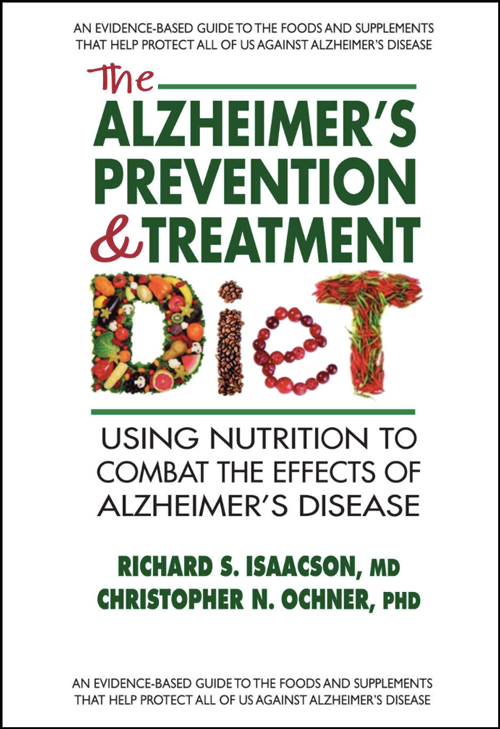The Alzheimer’s Diet
By Dr.Richard Isaacson | Prevention

As a neurologist working in an academic setting (University of Miami Miller School of Medicine), I divide my time between three areas: patient care, research, and education.
My specialty is Alzheimer’s disease (AD) and the important role nutrition plays in its management.
My interest in Alzheimer’s nutrition is personal, however. Four members of my family have been diagnosed with the disease. The two relatives I was closest to were my uncle Bob (diagnosed when I was in high school), and my dad’s cousin Charlotte, diagnosed shortly after I completed my subspecialty training in AD.
If it weren’t for Uncle Bob, I wouldn’t be here. Not only did he introduce my mom and dad, but he also saved my life when I was three years old.
At a family party, I fell into the swimming pool in my aunt’s backyard and descended to the bottom of the deep end. Uncle Bob dove in, fully clothed, pulled me out, and saved me.
Uncle Bob was always happy, smiling, telling jokes—the life of the party. Alzheimer’s disease first robbed him of his short-term memory, and then later his ability to care for himself.
However, I never allow his disease to cloud my own memories of what an incredible person he was to me.
Everyone knows someone with Alzheimer’s disease. More than 5 million Americans have the disease, and the number of AD cases is projected to more than triple by the year 2050.
Partly, the explosion of AD cases is due to the fact that we’re living longer, and advancing age is the number one risk factor for AD. However, aging is not the sole risk factor.
Recent scientific evidence suggests that changes in dietary and nutritional patterns may also be a causal factor in the rising number of AD cases.
Americans are eating more sugar and processed foods than ever before. We’re eating too many calories, way too many refined carbohydrates, and not enough fresh fruits and vegetables. We eat too much dangerous saturated fat and trans fat—and we eat too much in general.
Until recently, the significant impact that the food we eat has on our brain function was largely overlooked. Some of the nutrients in the foods we eat can themselves directly affect the brain, since they can penetrate directly into the brain by crossing what is referred to as the “blood-brain barrier.”
Other times, the food we eat causes the release of certain chemicals (hormones) that enter the brain and affect brain function.
A relatively new body of research has found that changes in dietary patterns can have a positive effect on memory. This is true for healthy people as well as for those with mild cognitive impairment and Alzheimer’s disease. (Read more about the studies here.)
Whether you’re starting to notice normal age-related memory decline, or simply want to keep your brain as healthy as possible, here are three general recommendations for a healthy brain diet.
Maximize:
- High-quality lean protein. The importance of protein for brain function cannot be overemphasized. Examples of recommended protein sources include fish high in DHA (e.g., wild salmon, mackerel, lake trout, herring, sardines, and albacore tuna); poultry (skinless white-meat chicken and turkey); lean meats (beef) that are hormone free; egg whites; and low- or no-fat dairy products.
- Vegetables (especially dark-green leafy vegetables) and berries (especially strawberries and blueberries). Note that these healthy choices do contain low-glycemic (good) carbohydrates that should be tracked, as limiting one’s overall glycemic load has been found to be essential for long-term brain health. A good website for checking the glycemic load of specific foods is at http://www.mendosa.com/gilists.htm. The relationship between glycemic load and reduced memory function is complex and beyond the scope of this article.
Moderate:
- Monounsaturated fats (e.g., extra-virgin olive oil, peanuts, avocadoes) and polyunsaturated fats (e.g., nuts and seeds).
- Complex carbohydrates (e.g., whole grains, quinoa).
Minimize:
- Simple (high-glycemic) carbohydrates (e.g., white bread, cane sugar, high-fructose corn syrup, and corn syrup in general).
- Saturated fats (eliminate all trans fats).
- Fried foods and dried foods (potato chips, corn chips, crackers, and dried fruits with sugar).
- Cakes and muffins.
- Bacon and hot dogs.
Other great brain foods include seeds and nuts (flaxseeds, walnuts, and pecans), legumes (small red beans, pinto beans, and black beans), unsweetened red or purple grape juice, curry and turmeric root, black or green tea, unsweetened dark cocoa powder, and dark-skinned fruits.
You can learn more about the science behind nutrition and brain function, and read more about the components of the complete healthy brain diet and lifestyle, including a 9-week meal plan, in The Alzheimer’s Diet: A Step-by-Step Nutritional Approach for Memory Loss Prevention and Treatment.
